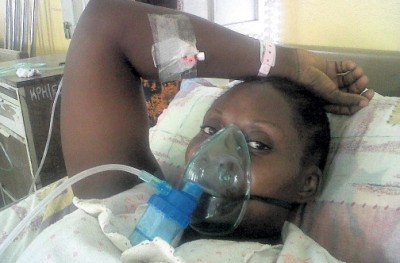
During her episodes, Karessa Marshall usually has difficulty breathing, and needs oxygen.
THE skip of a heartbeat is often associated with some happy occasion such as seeing a long lost friend or lover, or receiving some anxiously awaited good news, but this is not the case for 34-year-old Karessa Marshall.
A skipped heartbeat for her is usually a prelude to something much worse, such as escalating beats, which drop just as suddenly, resulting in weakness and fainting.
These sudden attacks give no warning, which is why it is dangerous for her to go too far from home. But the mother of two has no choice but to be up and about as she tries to raise at least US$950 for the deposit for her surgery in the United States.
A letter from the Kingston Public Hospital to the Ministry of Health, from which Marshall is seeking assistance, states that, “I believe she would benefit from ablative therapy as this illness has significantly impaired her quality of life”.
Ablative surgery, however, requires electrophysical studies to assess whether she is a good candidate for the procedure. This test is not available in Jamaica.
Having had her case accepted by reputable Johns Hopkins Hospital in Baltimore, which has provided her with a proposed itinerary for her stay and treatment, Marshall needs to come up with the funds within a week for the deposit or have her surgery postponed.
She would also be playing a game of chance, as the medical experts have already warned her that her heart could basically stop working.
Marshall has supraventricular tachycardia, a condition which is not rare, but what makes her case particularly difficult is that doctors cannot pinpoint what brings on her attacks, as well as the fact that her body has rejected all the medications administered.
The soft-spoken Luke Lane resident recalls that first frightening episode. “In June of last year I was at work at the general penitentiary sports club… I realised that my heart started palpitating and I started getting dizzy and weak. The Saturday there was a health fair at the church and I went and the doctor told me to go immediately and get some tests done because there is something wrong with my heart. I did so the Monday morning by Heart Foundation. They gave me a printout and said I was to go to KPH right away,” she recounts in a steady, calm voice.
This marked the start of what was to become frequent admissions to KPH, and constant batteries of tests, Marshall said.
“I did ECGs, I did echocardiogram, ultrasounds…they all came back saying everything was in place and they didn’t know what was causing the palpitations… it would go up to 180 beats per second and go as low as 60 beats. It would lower the blood pressure too much and cause me to black out,” she explained.
The doctors were at a loss, and after 18 days in the hospital she was discharged in July, but was readmitted within a week. “Each time I’m admitted… for each month it’s at least three weeks, right up to the 17th of December,” she said.
Finally, in November, a doctor informed her that her best route would be to have an electrophysiology test done, to determine if ablative therapy would correct her condition. An electrophysiology test records the electrical activity and the electrical pathways of the heart, and is used to help determine the cause of an arrhythmia.
“They came back and they said that there is a machine at the Heart Institute but if you use it, they would have to bring their own doctors from the States, and that is going to cost over $5.8 million,” the mother of two young children told the Jamaica Observer.
But true to her persistent nature, Marshall decided to pursue other avenues, and after doing her research online, approached Johns Hopkins Hospital. The initial US$950 will get her into the hospital to run the electrophysiology study, after which she will need at least US$4,000 to have the ablation carried out. Between treatment and therapy, Marshall expects to be at the hospital for at least four months.
With time bearing down, while she is seeking the assistance of the public to have these critical procedures done, the trained early childhood teacher, who also practises cosmetology, refuses to sit idly by. On Saturday, January 24, she will be hosting a fundraiser event at the Pearnel Charles Arcade in downtown Kingston, to come up with her visa fee, and air fare.
In the meantime, Marshall is hopeful that she will receive assistance from the Ministry of Health, in time to meet the deadline for the initial payment. The KPH has already submitted documentation of her case to the ministry, but one letter which was inadvertently not signed has to be resubmitted in order to start the process.
A frustrated but undaunted Marshall says she is stressed, but has to do everything necessary to get effective treatment.
Already, she said she has spent close to $300,000 on all the procedures she has had to do over the past six months. She has done so without an income, as doctors have cautioned her to tread lightly, given that she has no way of gauging when she will have an episode.
“It’s expensive… for example, the Holter monitor is US$100 per day, and that has to be done for two days. I have no health insurance, so everything has to be cash. I don’t know how I manage,” she said.
Marshall, who showed the Sunday Observer documents and letters from her doctors, as well as the Johns Hopkins medical team, says she can make these available to donors, if necessary, as evidence of her case.
Persons who wish to assist may make deposits to her Bank of Nova Scotia account (934 619); or Victoria Mutual Building Society account (217-24-661).

Someone please help her!!…Her health condition is very serious…